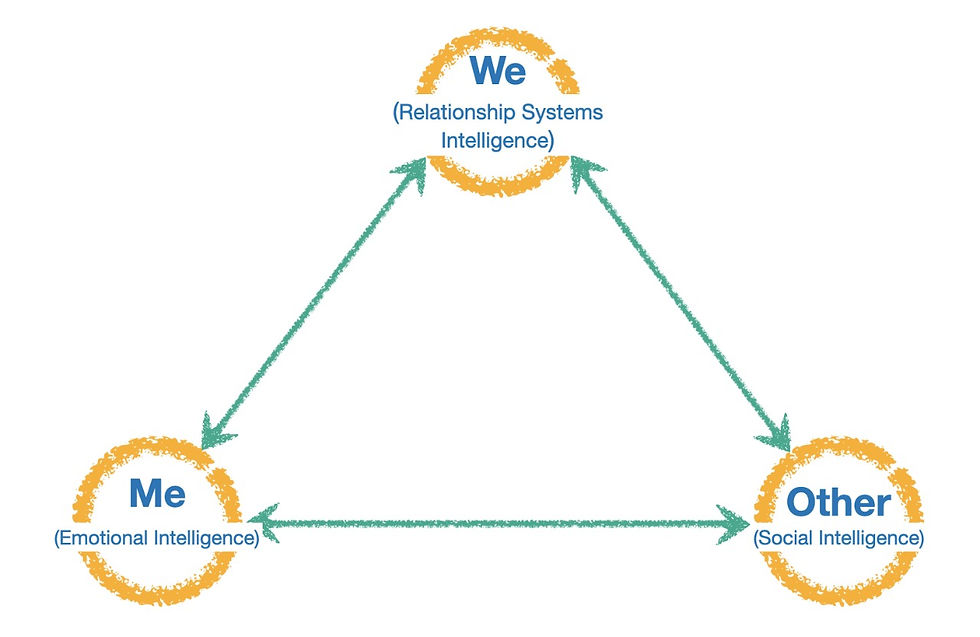Leading with ORSC: Strengthening Resilience in Changing Times
- Klaus Lombardozzi
- Apr 30
- 4 min read
Across the diverse and dynamic African business landscape, resilient leadership faces an unprecedented rate of change. Technological disruptions, evolving societal needs, and global economic shifts demand a new paradigm for organisational strength.
Leveraging ORSC and Relationship Systems Intelligence (RSI™), offers a robust framework for building resilience through change management and ensuring sustainable growth.

The Benefits of Taking an ORSC Systems Approach
Traditional management often focuses on individual performance or siloed departments. However, organisations are complex, interconnected systems. An ORSC systems approach recognises these intricate relationships, understanding that the whole is greater than the sum of its parts.
By focusing on the dynamics between individuals and teams, we gain a deeper understanding of underlying patterns, enabling us to address systemic issues rather than merely treating surface-level symptoms. This holistic perspective fosters collective ownership, enhances communication, and ultimately leads to more effective and sustainable solutions for managing change as a leader.
The 5 Principles Of ORSC and Relationship Systems Intelligence™
RSI™ provides a powerful lens through which to understand and navigate these complex systems. It is built upon five core principles:
(1) Relationship Systems are in a constant state of change
(2) Relationship Systems are naturally intelligent, generative, and creative
(3) Every member of the Relationship Systems is a voice of the system
(4) Relationship Systems rely on roles for their organisation and execution of function
(5) Each Relationship System has its own unique identity and personality

What is Resilience and How Does it Benefit Human-Focused Sustainable Business?
Resilience, in an organisational context, is the capacity not only to withstand shocks and disruptions but also to learn, adapt, and emerge stronger. It’s about agility in the face of adversity, the ability to bounce forward.
For human-focused sustainable businesses across Africa, resilience is not a luxury but a necessity. It enables us to navigate economic uncertainties, respond effectively to social and environmental challenges, and continue to create value for stakeholders while prioritising the well-being of our people and the planet. Building resilience through change management is fundamental to long-term success and impact. Developing leadership skills and resilience in turbulent times is crucial for guiding our organisations through these complexities.
How to Maintain Team Resilience in the Face of Constantly Shifting Relationship Systems?
The RSI™ principle, stating that ‘Relationship Systems are in a constant state of change’ (often referred to as emergence), is particularly pertinent for building resilience through change management. When leaders and teams deeply understand and intentionally engage with this principle, change ceases to be an external threat or a burdensome disruption. Instead, it becomes an inherent and accepted aspect of their collective reality. They recognise that the team or organisation is a living, breathing entity, continuously evolving in response to internal and external dynamics.
During times of rapid change, here's how team coaching can enhance psychological safety in order to navigate complexity together. |

By consciously working with this principle, teams cultivate a mindset of continuous adaptation. They become more comfortable with ambiguity and uncertainty, fostering a culture of experimentation and learning. Mistakes are seen not as failures, but as valuable data points in the ongoing process of evolution. This inherent acceptance of flux inspires agility, enabling teams to pivot swiftly and effectively when faced with new challenges or opportunities. Flexibility becomes ingrained in their processes and roles, allowing for seamless adjustments. Critically, this understanding fuels creativity, as team members feel empowered to explore novel solutions and innovative approaches in response to the ever-shifting landscape.
It requires leaders to manage change by empowering team members to contribute their unique perspectives and fostering a sense of collective responsibility for navigating the evolving environment. Building strong teams with adaptive and resilient leadership hinges on this understanding. By embracing leadership differences, organisations can build resilience. And for African leaders and HR managers to achieve sustainable success, they need to move beyond simply reacting to change and cultivate organisations that are inherently resilient, agile, and able to thrive in the face of challenges. Developing leadership skills and resilience in turbulent times necessitates this systemic understanding. Ultimately, managing change as a leader through this lens empowers our organisations not just to survive, but to thrive in the face of constant evolution.
ORSC Training with CRR Afrika
CRR Afrika provides a comprehensive ORSC training curriculum designed for leaders and coaches across the African continent. While our programs are primarily delivered online for accessibility and flexibility, we also provide in-person training for intact teams when deeper, hands-on engagement is needed.
The five modules that comprise the full ORSC Training curriculum provide leaders and coaches with over 30 powerful tools and 20+ key skills to establish Relationship Systems Intelligence and enhance psychological safety wherever people come together to achieve something.
How to Stay Connected?
Register today or explore our 2025 schedule to join one of our introductory modules. If you'd like to learn more about how ORSC and RSI can help you as a leader or coach, contact our team. We are always happy to connect.



Comments